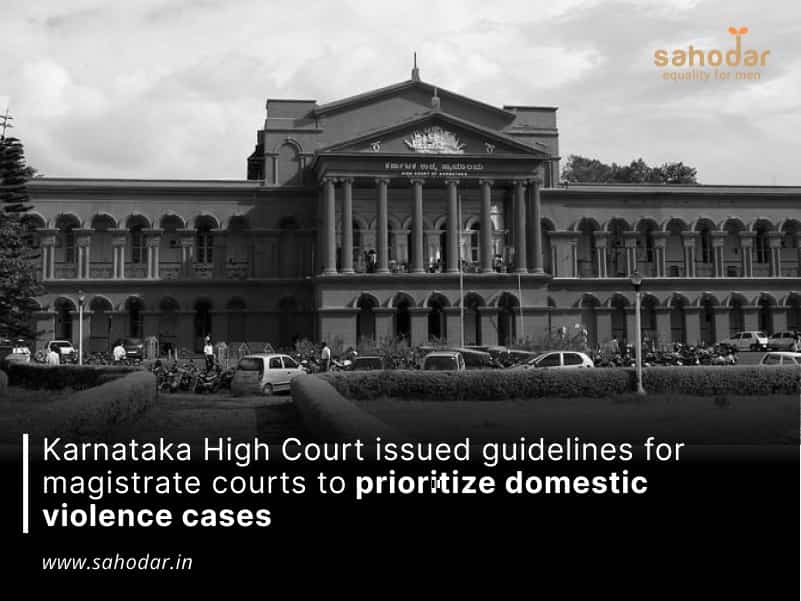The Karnataka High Court, through Justice M Nagaprasanna, has issued orders for magistrate courts to handle cases filed by domestic violence victims under the Protection of Women from Domestic Violence Act, 2005, within 60 days of filing. Justice Nagaprasanna stressed the importance of prompt action by the courts to address such cases, as the court’s role is to provide redressal for grievances and avoid delays. The actus curiae neminem gravabit principle reinforces the need for timely disposition of cases. The court emphasized that magistrate courts should prioritize cases involving women who are victims of domestic violence and seek shelter or maintenance. The court also pointed out that sub-section (5) of Section 12 mandates that all applications should be disposed of within 60 days, and the word “every” in the provision implies that no application should be left unresolved.
The Karnataka High Court emphasized that prolonged delays in handling cases related to domestic violence victims under the Protection of Women from Domestic Violence Act could defeat the very purpose of the legislation and deny justice. The court stressed the importance of prompt action, citing the proverb “justice delayed is justice denied.” Before issuing the guidelines, the court found it necessary to direct Magistrate Courts to render decisions on applications submitted by victims within the prescribed timeframe.
The Karnataka High Court has issued guidelines that mandate the timely handling of applications filed under Sections 18, 19, or 20 of the Protection of Women from Domestic Violence Act. The court orders the concerned court to make a decision within 60 days of filing for such applications. The husband is required to submit an assets and liabilities statement within 4 weeks of filing an application under Section 20. If he fails to do so, the court will accept the application filed by the wife/aggrieved person and pass orders accordingly. If the opposite party objects to an application filed by the aggrieved person under Sections 18 and 19, they must do so within 4 weeks of receiving notice. Failure to do so will allow the concerned court to pass appropriate orders. The court may use its inherent power under Section 28(2) of the Act to regulate its procedures to meet these timelines.
The Karnataka High Court stressed the significance of the directives issued to Magistrate Courts for the timely resolution of applications filed under the Protection of Women from Domestic Violence Act. The court emphasized the need to strictly adhere to these guidelines, and any deviation from them must be put in writing while passing orders on applications. The court considered the timely disposal of these applications crucial, as Section 12 is the foundation of the legislation, and any delay in providing relief could undermine its efficacy. According to the court, the success of the Act is dependent on prompt resolution of cases, as prolonged delays may lead to the legislation losing its effectiveness.
Finding of the court:
The Karnataka High Court examined the objectives and provisions of the Protection of Women from Domestic Violence Act, particularly sub-sections (2), (3), (4), and (5) of Section 12, which allow an aggrieved person to seek compensation or redressal for domestic violence. The court highlighted that sub-section (5) requires every application filed under sub-section (1) to be disposed of within 60 days from the date of the first hearing by the Magistrate. Upon reviewing the case records, the court found that certain applications, filed over four years ago, were still pending consideration. The court emphasized that all applications filed under Sections 18, 19, and 20, as well as applications filed concurrently with Section 12, must be decided by the Magistrate within the 60-day time frame mandated by sub-section (5) of Section 12.
The bench observed that despite being filed 52 months earlier, certain applications seeking alternative accommodation, monetary relief, and ex-parte interim maintenance were still pending consideration. The court emphasized the importance of complying with the timeframe stipulated under sub-section (5) of Section 12, which requires all applications filed under Sections 18, 19, and 20, along with the application under Section 12, to be decided within 60 days from the date of their first hearing by the Magistrate. Moreover, the court reiterated that any application filed concurrently with an application under Section 12 must also be disposed of within the same timeframe. The court deemed it crucial to dispose of applications within the given timeline to ensure the effectiveness of the Act. As a result, the court allowed the petition and directed the concerned court to dispose of the pending applications within four weeks. Additionally, the court urged the parties to cooperate with the court in passing appropriate orders on the applications and warned that failing to do so could result in the court passing ex-parte orders under Section 23 of the Act.
Source: https://www.livelaw.in/news-updates/karnataka-high-court-disposal-of-application-dometic-violence-act-accommodation-monetary-relief-interim-maintenance-224447

